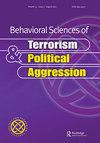更多攻击还是更多服务?2019冠状病毒病疫情期间阿富汗、叙利亚和索马里叛乱组织的行为
IF 1.4
Q2 POLITICAL SCIENCE
Behavioral Sciences of Terrorism and Political Aggression
Pub Date : 2020-12-08
DOI:10.1080/19434472.2020.1856911
引用次数: 2
摘要
摘要自新冠肺炎疫情爆发以来,以服务为目的的叛乱组织做出了不同的反应,一些组织在持续的不稳定中发起了更多的袭击,而另一些组织则立即转向了预防措施,如发起公众意识运动和建立隔离中心。是什么导致了这些不同的反应?根据公开和半私人来源,本文研究了阿富汗的塔利班、叙利亚的Ha’ayt Tahrir al-Sham(HTS)和索马里的al-Shabaab如何应对新冠肺炎大流行。研究结果表明,不同的反应源于疫情话语的框架。塔利班和HTS都将其解释为一场灾难,需要做出回应,并相应地调整其活动方向,加强对战斗人员的袭击,同时通过提供医疗服务来利用疫情造成的人道主义真空。然而,随着疫情的激增,这两个团体逐渐减少了战斗人员的目标,并优先提供医疗服务,以增强其合法性,并为其原始国家建立民众支持。相比之下,青年党将疫情称为西方和中国的“问题”,并没有对应对危机的行动做出明显改变,只是在疫情恶化时才姗姗来迟地开始提供医疗服务。本文章由计算机程序翻译,如有差异,请以英文原文为准。
More attacks or more services? Insurgent groups’ behaviour during the COVID-19 pandemic in Afghanistan, Syria, and Somalia
ABSTRACT Since the outbreak of the COVID-19 pandemic, service-providing insurgent groups have responded differently, with some initiating more attacks amid ongoing destabilisation while others have immediately veered towards precautionary measures such as initiating public awareness campaigns and setting up quarantine centres. What drives these divergent responses? Relying on publicly available and semi-private sources, this article examines how the Taliban in Afghanistan, Ha'ayt Tahrir al-Sham (HTS) in Syria, and Al-Shabaab in Somalia have operationalised their responses to the COVID-19 pandemic. The findings reveal that the divergent responses are rooted in the framing of the pandemic discourse. The Taliban and HTS both interpreted it as a calamity that needs responding to and repurposed their activities accordingly by stepping up their attacks against combatants while concomitantly exploiting the humanitarian vacuum created by the pandemic by delivering health services. However, as the pandemic surged, the two groups gradually scaled down their combatant targeting and prioritised delivering health services to bolster their legitimacy and build popular support for their proto-states. By contrast, Al-Shabaab labelled the pandemic as a Western and Chinese ‘problem’, and made no visible changes to their operations in response to the crisis, only belatedly beginning to offer health services as the pandemic worsened.
求助全文
通过发布文献求助,成功后即可免费获取论文全文。
去求助
来源期刊

Behavioral Sciences of Terrorism and Political Aggression
POLITICAL SCIENCE-
CiteScore
4.80
自引率
10.00%
发文量
27
 求助内容:
求助内容: 应助结果提醒方式:
应助结果提醒方式:


